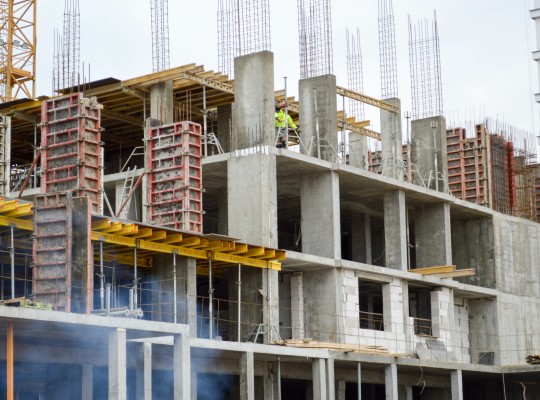Some climates such as those in GCC (Gulf Cooperation Council) countries make it extremely difficult to build structures with long service lives. Hot temperatures and other harsh elements make corrosion a constant threat to the durability of reinforced concrete. Rather than default to expensive options such as epoxy coated rebar and extra thick concrete cover, Cortec’s MCI® Technology offers a cost-effective alternative to extend structural service life in high temperature areas.
Why Is Corrosion Such a Problem in GCC States?
The higher the temperature, the faster corrosion can occur. Every time the temperature rises by 10 °C (50 °F), corrosion activity can double. Since temps in the GCC frequently exceed 38 °C (100 °F) in the summer, the processes at work to rust rebar in reinforced concrete structures are in full force. Add to this the proximity of salt-laden air in coastal areas and the presence of chlorides in sabkha soil or high water tables, and the risk for structural deterioration is even higher. At the same time, a strong cultural desire exists to create sustainable structures that will last for the next generation.
How MCI® Can Help?
Migrating Corrosion Inhibitors (MCIs) are an excellent antidote to corrosion in reinforced concrete structures. By specifying MCI®, engineers can significantly extend the expected service life of the structure at a small percentage of the construction cost. These amine-carboxylate based inhibitors affect both the anodic and cathodic portions of a corrosion cell and can be applied in many forms, including concrete admixtures and topical treatments. MCI® can migrate through the concrete matrix as a liquid via capillary action and as a vapor throughout the pore structure. An affinity to metal allows MCI® molecules to adsorb on the surface of metal reinforcement, forming a protective layer that delays time to corrosion and significantly reduces corrosion rates once started. It is the one of the easiest and most cost-effective methods of protecting metal reinforcement from corrosion when compared to epoxy coated rebar, cathodic protection, and calcium nitrite.
New Construction or Facility Maintenance?
Adding MCI® from the start is an excellent way to protect against corrosion in high chloride, high temperature GCC coastal environments. MCI® Technology can be applied to new structures as a concrete admixture such as MCI®-2005, a USDA Certified Biobased Product that does not accelerate set time (unlike calcium nitrite, which can make the concrete mix extremely difficult to work with in hot weather). However, existing structures never enhanced with MCI® can still benefit from an MCI® surface applied corrosion inhibitor (SACI) applied during repair or routine application of a water repellent. MCI®-2020 offers the highest concentration of MCI® SACIs and should be followed by the application of a water repellent or other sealing material (be sure to check compatibility). For the convenience of two-in-one application, MCI®-2018 combines MCI® with a 100% silane water repellent for dual protection against the elements.
Where Has MCI® Been Used in the GCC?
MCI® Technology has been used in countless structures exposed to the GCC climate. Most notable is the Burj Khalifa, the tallest building in the world to date built with a 100-year design life. Due to harsh groundwater conditions, MCI®-2005 was added to the substructure for extra protection. The application was similar for the Princess Tower, where the service life prediction doubled with the addition of MCI®-2005 at less than 1/10 of a percent of total construction costs. MCI®-2005 has also been specified in medical and hospitality facilities in the region.
The Logical Choice to Extend Service Life – The high temperatures and corrosive environments of the GCC are unavoidable. The only answer is to build structures in a way that will slow down the corrosion process and thereby extend service life. MCI® makes the most economical and practical sense for that purpose and has a long track record of use in the GCC. Contact Cortec® to learn more about using MCI® in corrosive, high temperature climates.









